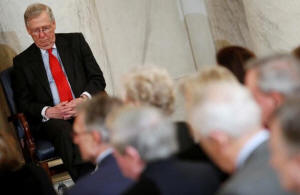|
Senate Republican leader backs
investigation into Russian hacking
 Send a link to a friend
Send a link to a friend
 [December 13, 2016]
By Dustin Volz and Patricia Zengerle [December 13, 2016]
By Dustin Volz and Patricia Zengerle
WASHINGTON (Reuters) - The Senate's top
Republican broke with President-elect Donald Trump on Monday over
whether Russian hacking during the U.S. election merited closer
scrutiny, a fissure between Trump and his party that appeared to grow as
lawmakers pressed for a special investigation into the matter.
The divide raised the possibility of enduring clashes between Trump and
Republicans during his presidency over how to handle Russian President
Vladimir Putin, a leader long viewed by many in the party as a
calculating, untrustworthy foe but whom Trump has repeatedly praised for
his leadership.
"The Russians are not our friends," Senate Majority Leader Mitch
McConnell told a news conference.
Calls on Sunday by two leading Republican foreign policy voices,
Senators John McCain and Lindsey Graham, to investigate Russia's hacking
were buoyed on Monday by McConnell, who said Russia's involvement needed
further investigation.
"Any foreign breach of our cyber security measures is disturbing, and I
strongly condemn any such efforts," McConnell said. "This simply cannot
be a partisan issue."

McConnell said it "defies belief" that Republicans would be reluctant to
investigate Russian actions.
McConnell's remarks contrasted with those of Trump and his staff, who
scoffed at reports that the CIA had concluded the hacks and leaks of
Democratic emails were carried out with the goal of helping Trump defeat
Democrat Hillary Clinton. Trump said the conclusion was "ridiculous."
Some lawmakers have called for a special committee to investigate the
hacking, but McConnell did not back that idea, saying he has confidence
in the Senate Intelligence and Armed Services committees. Cory Gardner,
a Republican, said the Russian hacking reflected the need for a
permanent committee dedicated to cyber security.
It was not clear how the House of Representatives would respond to the
hacking and calls for investigations. House committees have not
announced plans for hearings, and Republican House Speaker Paul Ryan
issued a statement criticizing Russia but blasting what he termed
"exploiting the work of our intelligence committee for partisan
purposes."
Though congressional Republicans support a probe of Russia's involvement
in the election, they have shied away from agreeing with the CIA's
assessment that the hacks were deliberately carried out to undermine
Clinton.
"It's obvious that the Russians hacked into our campaigns," McCain said
Monday in an interview with Reuters. "But there is no information that
they were intending to affect the outcome of the election, and that's
why we need a congressional investigation."
ELECTORS WANT BRIEFING ON HACK
Separately on Monday, one Republican and nine Democratic electors led by
the daughter of the House Democratic leader, Nancy Pelosi, wrote to
James Clapper, the U.S. Director of National Intelligence, requesting a
briefing on the hacking reports before the Electoral College formally
decides the election on Dec. 19.
[to top of second column] |

Senate Majority Leader Mitch McConnell (R-KY) in Washington, U.S.
December 8, 2016. REUTERS/Jonathan

John Podesta, chairman of Clinton's presidential campaign, said in a
statement that the campaign supported the electors' letter, which
raises "very grave issues involving our national security."
Clapper's office did not respond to a request for comment about the
letter.
Charles Schumer, who will be the Senate Democratic leader next year,
said he welcomed McConnell's support for "a deep and thorough
bipartisan investigation" with access to all relevant intelligence.
Trump and his staff have repeatedly dismissed the reports as
"ridiculous," blaming them on Democrats unhappy that Trump won.
"Can you imagine if the election results were the opposite and WE
tried to play the Russia/CIA card," Trump said on Twitter on Monday.
"It would be called conspiracy theory!"
A second tweet said, "Unless you catch 'hackers' in the act, it is
very hard to determine who was doing the hacking. Why wasn't this
brought up before election?"
White House press secretary Josh Earnest on Monday pointed to a
public statement from the intelligence community in early October
that concluded the hacking had been authorized by "Russia's
senior-most officials" and was aimed at sowing discord in the U.S.
election.
That statement stopped short of alleging that Russia wanted to help
Trump. But Earnest suggested on Monday that may have been the
intent.

"You didn't need a security clearance to figure out who benefited
from malicious Russian cyber activity," Earnest said. "The
president-elect didn't call it into question. He called on Russia to
hack his opponent. He called on Russia to hack Secretary Clinton."
(Additional reporting by Jonathan Landay, Doina Chiacu and Susan
Heavey; Editing by Bill Trott and Jonathan Oatis)
[© 2016 Thomson Reuters. All rights
reserved.]
Copyright 2016 Reuters. All rights reserved. This material may not be published,
broadcast, rewritten or redistributed. |